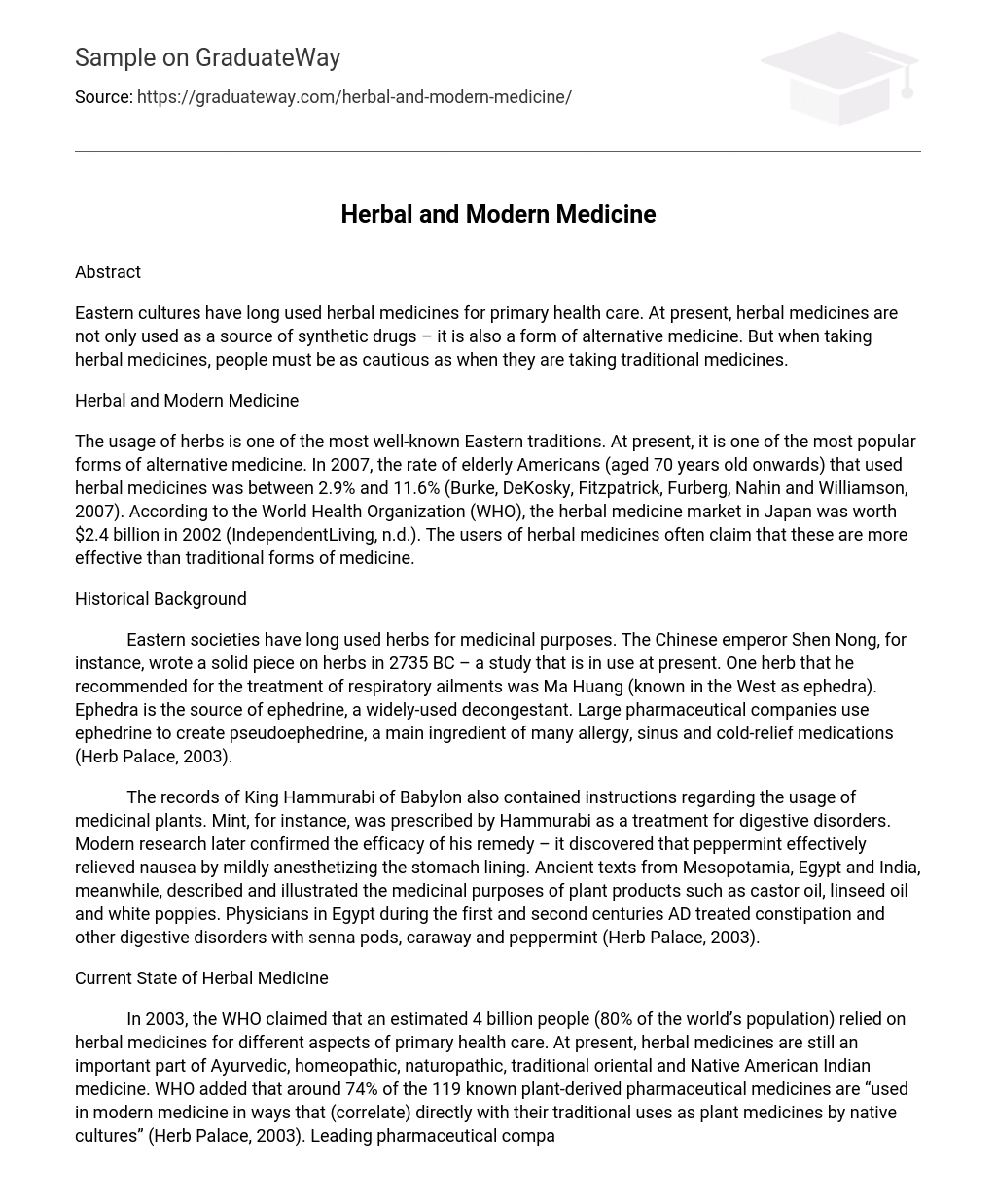Eastern cultures have long used herbal medicines for primary health care. At present, herbal medicines are not only used as a source of synthetic drugs – it is also a form of alternative medicine. But when taking herbal medicines, people must be as cautious as when they are taking traditional medicines.
The usage of herbs is one of the most well-known Eastern traditions. At present, it is one of the most popular forms of alternative medicine. In 2007, the rate of elderly Americans (aged 70 years old onwards) that used herbal medicines was between 2.9% and 11.6% (Burke, DeKosky, Fitzpatrick, Furberg, Nahin and Williamson, 2007). According to the World Health Organization (WHO), the herbal medicine market in Japan was worth $2.4 billion in 2002 (IndependentLiving, n.d.). The users of herbal medicines often claim that these are more effective than traditional forms of medicine.
Eastern societies have long used herbs for medicinal purposes. The Chinese emperor Shen Nong, for instance, wrote a solid piece on herbs in 2735 BC – a study that is in use at present. One herb that he recommended for the treatment of respiratory ailments was Ma Huang (known in the West as ephedra). Ephedra is the source of ephedrine, a widely-used decongestant. Large pharmaceutical companies use ephedrine to create pseudoephedrine, a main ingredient of many allergy, sinus and cold-relief medications (Herb Palace, 2003).
The records of King Hammurabi of Babylon also contained instructions regarding the usage of medicinal plants. Mint, for instance, was prescribed by Hammurabi as a treatment for digestive disorders. Modern research later confirmed the efficacy of his remedy – it discovered that peppermint effectively relieved nausea by mildly anesthetizing the stomach lining. Ancient texts from Mesopotamia, Egypt and India, meanwhile, described and illustrated the medicinal purposes of plant products such as castor oil, linseed oil and white poppies. Physicians in Egypt during the first and second centuries AD treated constipation and other digestive disorders with senna pods, caraway and peppermint (Herb Palace, 2003).
Current State of Herbal Medicine
In 2003, the WHO claimed that an estimated 4 billion people (80% of the world’s population) relied on herbal medicines for different aspects of primary health care. At present, herbal medicines are still an important part of Ayurvedic, homeopathic, naturopathic, traditional oriental and Native American Indian medicine. WHO added that around 74% of the 119 known plant-derived pharmaceutical medicines are “used in modern medicine in ways that (correlate) directly with their traditional uses as plant medicines by native cultures” (Herb Palace, 2003). Leading pharmaceutical companies continue to carry out extensive research on the potential medicinal value of plant materials taken from locations such as rain forests and deserts (Herb Palace, 2003).
Below are some well-known herbs that have known medicinal value:
- Gingko (Gingko biloba) – It is known to improve awareness, judgment and social function in people with Alzheimer’s disease and dementia. Gingko is also regarded as a memory enhancer (UMMC, 2008).
- St. John’s Wort (Hypericum perforatum) – This herb is a widely-known antidepressant. Psychiatrists often prescribe this herb to treat mild to moderate depression (UMMC, 2008).
- Valerian (Valeriana officinalis) – It is regarded as an herbal sedative, along with lavender and chamomile (UMMC, 2008).
- Echinacea – It is an herb that has been used to treat colds, cough, sore throat and other infections (eSsortment, n.d.).
- Garlic – It decreases cholesterol levels, has antibacterial and antifungal properties and is also known as a mild analgesic.
As with any other drug, herbal medicines should be taken with caution. Below are some safety precautions that must be observed when taking herbal medicines:
- Consult a doctor before taking any kind of herbal medicines.
- Research on the possible side effects of the herbal medicine you are about to take.
- Take herbal medicines at the right time, dosage and frequency.
- As a general rule, children, the elderly, pregnant women and people with compromised immune systems must not take herbal medicines without a doctor’s supervision.
Herbal medicines can be just as effective as traditional medicines. It must be noted than traditional medicines are merely synthesized versions of medicinal plants. However, prudence and common sense must still be exercised when taking herbal medicines. Its being “natural” is never an excuse for its misuse.
References
- Burke, G.L., DeKosky, S.T., Fitzpatrick, A.L., Furberg, C., Nahin, R.L. & Williamson, J.D. Medscape Today. (2007, December 1). Use of Herbal Medicine and Other Dietary Supplements in Community-Dwelling Older People: Baseline Date From the Ginko Evaluation of Memory Study.
- Herb Palace. (2003). History of Herbal Medicine. Retrieved June 29, 2008, from http://www.herbpalace.com/alternative-medicine/herbal-medicine.html
- University of Maryland Medical Center (UMMC). (2008). Herbal Medicine. Retrieved June 29, 2008, from http://www.umm.edu/altmed/articles/herbal-medicine-000351.html
- World Health Organization. (n.d.). World Health Organization: Facts about Traditional Healing. Retrieved June 29, 2008, from http://www.independentliving.co.uk/tradmed.html





